Diana DiZoglio Won’t Back Down
The most famous and controversial state auditor in generations—can you name another one?—has made it her mission to bring bright, sunshine-y transparency to the Massachusetts legislature. Pity the fool who gets in her way.
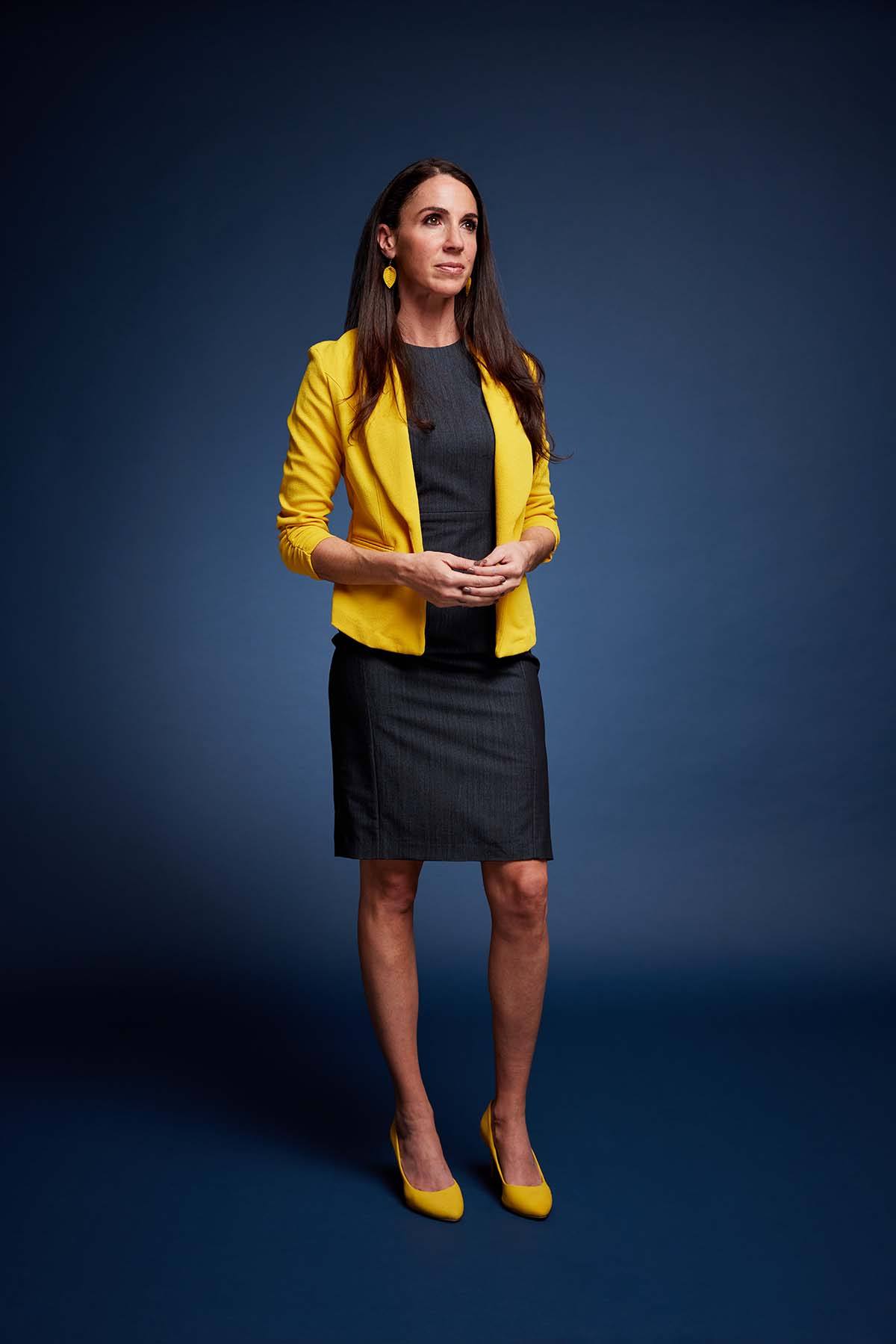
Photo by Ken Richardson
In the predawn hours of November 3, Diana DiZoglio flicked on the basement lights in her Methuen home and walked barefoot down the wooden stairs to the cellar. A firm believer in the mental and physical health benefits of daily cold plunges, the controversial state auditor opened the top of a chest freezer and climbed inside, lowering herself down into the 39-degree water until she was submerged up to her neck. Her lungs seized up from the cold—stealing her breath—but she endured, focusing on breathing to calm the rising tide of panic within. Though DiZoglio couldn’t feel her feet from the cold, she stayed in a Zen-like trance for 10 long minutes before quickly dunking her head under the surface of the frigid water and clambering out of the freezer. She felt focused, energized, and ready to take on the day. And she was going to need it.
The previous evening, DiZoglio had received a significant blow from the attorney general on her quest to conduct a performance audit of the state legislature—a mission that has shaken up local politics by pitting rank-and-file Democrats aligned with some Republicans against Democratic Party leaders. DiZoglio has vowed to cast sunlight on the lawmaking body, which has repeatedly earned failing grades and dismal rankings from local and national advocacy and research organizations for its lack of transparency. Lawmakers have refused to cooperate with DiZoglio, arguing that she not only lacks the statutory authority to audit the legislature but also that an audit by an officer of the executive branch would violate the principle of separation of powers enshrined in the state constitution. DiZoglio responded by threatening to take the lawmakers to court and then asked Attorney General Andrea Campbell for the necessary legal go-ahead to do so. When the phone rang that night, it was Campbell calling ahead of releasing her formal decision.
As DiZoglio paced the length of her living room, Campbell explained that her team had determined state law does not give DiZoglio’s office the power to audit the legislature. Anticipating this might happen, DiZoglio had already set into motion a clever plan B: Collect enough signatures to get her issue on the ballot in November. But Campbell hinted at bad news on that score, too, saying that if the ballot question became law, her office might need to evaluate how “constitutional limitations” would affect the application of that law.
Hanging up the phone, DiZoglio sank into her couch, utterly demoralized. But after her cold plunge the following morning, she felt the familiar jolt of newfound resolve. Just as the sun made its way over the horizon in Methuen, flooding her home with light, DiZoglio released her response to Campbell, announcing she would “continue to fight to get this issue on the ballot so voters have the opportunity to make it crystal clear that they expect transparency and accountability from the Legislature they pay for.” In other words, DiZoglio was doubling down on plan B.
Over the next couple of days, she attended events, spoke to voters, and rallied her troops to collect signatures for the ballot initiative, now her only path to victory, working to dispel any concerns that this was some lost cause, or worse, a waste of time. “I say this all the time—half the battle is outlasting your opposition,” she told me. “Resilience is a very important character trait. How many punches can you take and keep getting back up again? I mean, how much can you take and keep going?”
I quickly turned the question back on her: “How much can you take?”
“A lot,” she said before I could barely finish the question.
DiZoglio wasn’t kidding. She may well be the human embodiment of a Weeble, one of those popular weighted oblong kids’ toys from the 1970s: No matter how hard her opponents, critics, and even life itself try to knock her down, she bounces right back up. (As the TV jingle went: “Weebles wobble, but they don’t fall down.”)
Over lunch with DiZoglio, whose white hoodie displayed an image of Frida Kahlo and the quote “Not Fragile like a Flower, Fragile like a Bomb,” I asked about the source of her resilience. She shrugged and recited a line from “Lose Yourself” by Eminem: “Success is my only option, failure’s not,” noting between bites of sweet-potato fries that she went ahead and “cut out the cussword” in the lyrics for me. There is an exception, though, DiZoglio notes. “Failure is okay, so long as you fail forward.”
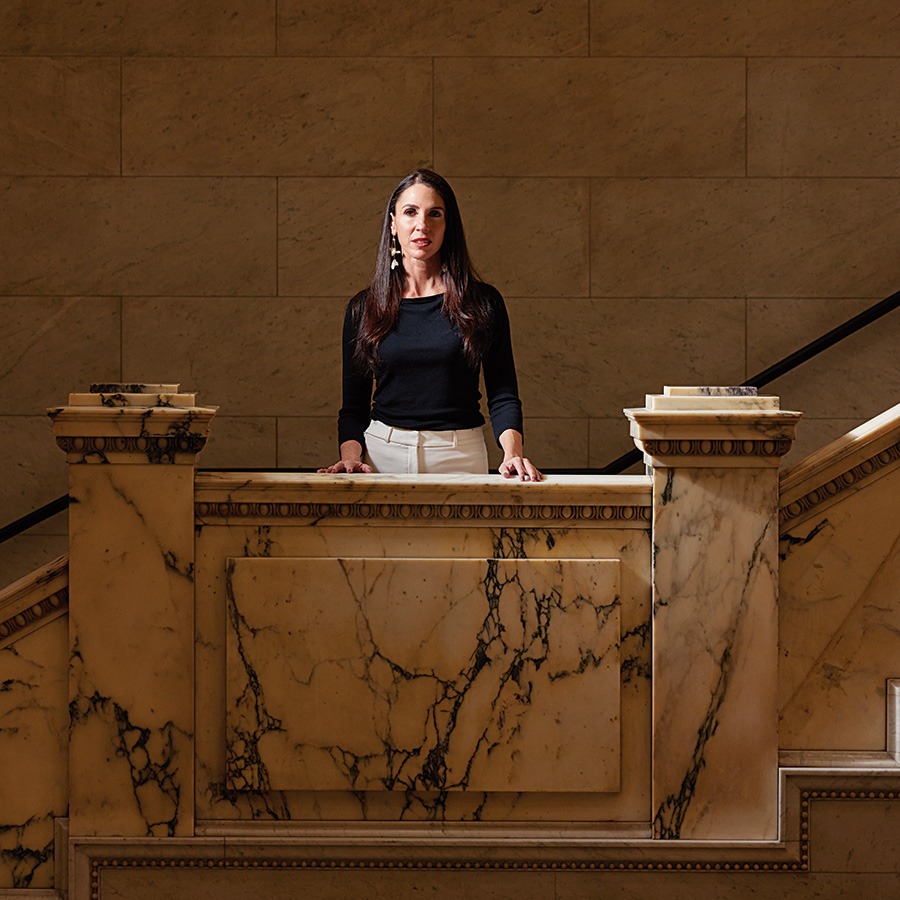
DiZoglio, pictured in the State House, has a knack for trading up and advancing each time she hits a roadblock in her professional career. / Photo by Ken Richardson
That sentiment is, in many ways, the story of DiZoglio’s life. Each time she has faced a trauma, a crisis, or a major professional setback, she has righted herself and then advanced. The daughter of a single teen mother, DiZoglio rose from a childhood of domestic violence, sexual abuse, and housing insecurity that sent her bouncing between the homes of friends and relatives to win a scholarship to Wellesley College. When she landed her first job out of school as a legislative aide, and the rumor mill claimed she’d had a sexual relationship with a representative in the chamber after hours (investigators later determined that nothing sexual in nature occurred), her boss fired her. She then showed them what real resolve looked like by storming back into the golden dome less than two years later—as an elected representative. When she refused to go-along-to-get-along with the powerful House leadership’s demands to vote certain ways, she was sidelined. Once again, instead of backing down, she took a step forward, running for and winning a seat in the state Senate. When she found a similarly restrictive top-down structure in the Senate, she pivoted again and ran for state auditor.
During the primary, DiZoglio was the underdog. In the general election, the Boston Globe endorsed a Republican over her, but she persisted and prevailed. “This is a woman who has come up facing adversity her whole life,” says Dan Winslow, president of the New England Legal Foundation, who served as chief legal counsel to former Governor Mitt Romney and is a proponent of the audit. “She seems to be somebody who is energized by it and by difficult situations.”
Now, DiZoglio faces her toughest battle yet, and the stakes couldn’t be higher for voters across the state who want a more transparent—and, as such, representative—legislature. At the same time, the hours logged on the battlefield have given DiZoglio’s political star a major boost. Launching a wildly popular campaign against a woefully unpopular branch of government, it turns out, has made her far and away the most high-profile auditor the state has ever seen—just try and name another one—and arguably one of the most visible statewide elected officials.
There’s already talk of what’s next for DiZoglio, and the two possibilities that come up most often among the chattering class are governor and U.S. senator—though the people who say it don’t always mean it as a compliment. Some of her critics argue that DiZoglio’s whole crusade seems intentionally designed to advance her career—that is, if she doesn’t blow it. Still, betting against DiZoglio has never been a smart move. After all, Winslow says, “The best way to get Diana DiZoglio to do something is to tell her that she can’t.”
Today, DiZoglio faces her toughest battle yet, and the stakes couldn’t be higher for voters across the state who want a more transparent—and, as such, representative—legislature.
The seeds for DiZoglio’s battle with the legislature were planted more than a decade ago during an after-hours party on Beacon Hill. Staffers and members of the House were gathered in the speaker’s office, where the open door spilled a beam of light into the darkened, empty chamber adjacent to it. People had been ducking into the chamber all evening long to socialize, and at some point, DiZoglio, then an aide to Republican state Representative Paul Adams, and Democratic state Representative Mark Cusack stepped inside to talk.
Within days, the State House—known then (even more than today) as a testosterone-fueled boys’ club—was on fire with rumors that “some girl” had been in the chamber hooking up with a representative. DiZoglio didn’t know that anyone at work was talking about her until her name was leaked to the press, and she heard that reporters were inquiring about her. Then staffers started laughing at DiZoglio when she walked into the room, she says, while some colleagues stopped talking to her altogether. A few even boldly propositioned her for sex. She was 27 years old.
DiZoglio cried before, during, and after work. She has called it a life-ruining experience. “I remember the people who were incredibly kind during that time,” she told me. “But they were few and far between because the general consensus was ‘she has a scarlet letter.’ It was very challenging.”
DiZoglio has long maintained that she and Cusack did nothing more than talk that evening in the Chamber. Still, even after the House leadership investigation determined nothing inappropriate had happened between them, the only one punished for the sexual harassment she endured in the workplace after the incident was DiZoglio herself. Her boss fired her, and if she wanted to collect any severance pay, she says, House leadership informed her she would have to sign a nondisclosure agreement, or NDA, which included a non-disparagement clause. DiZoglio, who knew she would soon go broke, says she signed under duress. Then-speaker Robert DeLeo has said that he and his staff were unaware that DiZoglio had been a victim of sexual harassment at the time.

Photo by David Greitzer
Next, she took a job as the chief of staff to Edward Kelly, head of the Professional Fire Fighters of Massachusetts, which at the time was located on Bowdoin Street, across from the State House. Every day, DiZoglio went to work in an office that overlooked the golden dome. Was she relieved to no longer be there? Was she traumatized by the very sight of it? No. In fact, she became determined to get back in—this time through the front door, as a state representative. She longed to help people who’d struggled like she and her family had, as well as be a voice for residents who, she says, feel as though “they’ve been put down by the powerful and the privileged.” Her grandmother tried to talk her out of public office, worried she’d face more embarrassment and hurt. Nana, as DiZoglio calls her, wasn’t wrong. “It was like a joke to a lot of people on the Hill,” DiZoglio says. “They were laughing about the fact that I was running; it was funny to them…. I don’t want to sound corny, but it’s like I had a deep sense of knowing that I was supposed to do it, even though it seemed like the most outlandish thing possible to other people.”
In many ways, it was outlandish. The seat she was gunning for belonged to a 14-year incumbent, while DiZoglio was a young, scorned former aide whose reputation was in tatters. She knew the scandal would become an issue on the campaign trail—it did—and that she wouldn’t be able to defend herself because of her restrictive NDA. “She is as gutsy a person as I know,” says a political consultant who asked not to be named because he works with legislators. “I know plenty of very strong women who would have been broken by what happened and would have said, ‘I’m going to do something else with my career. I’m never going back to that place.’ But she ran, won, and walked right back in there.”
Critics from inside and outside the legislature have long complained that everything from committee chair appointments—which come with a significant pay bump—to parking spots to who gets which office is decided by leadership. The price for all of these perks, large and small? Complete and total voting allegiance. “If you buy into leadership and don’t challenge them in any way and do exactly what they tell you to do, you’re fine. And if you don’t do that, you become irrelevant,” says former state Representative Cory Atkins, adding that to go along with leadership, you have to “give up big chunks of yourself.”
DiZoglio was unwilling to do that. As a result, she says, while she did work hard for her constituents, her three-term tenure was an uphill battle. Her biggest clash with leadership came at the height of the #MeToo movement, when House representatives were debating a new sexual harassment policy. Despite DiZoglio’s efforts, leadership did not include a ban on NDAs or non-disparagement agreements, so she wrote an amendment for it.
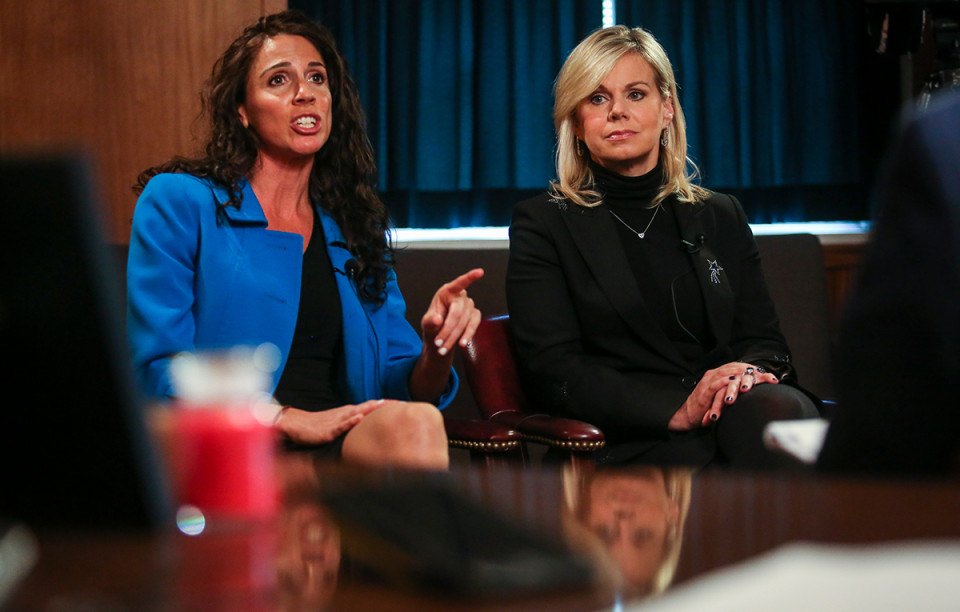
In January 2020 in Boston, DiZoglio, left, and former Fox News host Gretchen Carlson speak to the media while they advocate for a bill introduced by DiZoglio that would bar the use of nondisclosure agreements in sexual harassment cases.
When it came time to publicly debate the policy, DiZoglio made her way to the podium, looking every bit the poised politician. Inside, though, her heart was hammering in her chest at the thought of what she was about to say. Looking straight ahead, she told the story of what happened to her as an aide, breaking her NDA in the most public way possible. “I’m not here to argue about the past. Today is about the future,” she told the chamber. “We should not be in the business of silencing our critics or covering up any harassing or discriminatory behavior…with public funds.”
After that, DiZoglio ascended to hero status among many female staffers in the building and gained a reputation as someone—one of the only people—unafraid to publicly take on House leadership. At the same time, she says, “people in leadership, lobbyists, staffers, everybody who knows how Beacon Hill operates basically told me, ‘You’re done in this place. You will experience a lot of misfortune because of your decision. You may as well throw in the towel.’”
In a way, she did throw in the towel, but in the most DiZoglio of ways: She ran for higher office—a seat in the Senate—and won. At first, it seemed like life might be different there, but soon, she says, she ran into the same top-down system, where all the power was in leadership’s hands. “The State House has a way of homogenizing people—they all end up thinking, speaking, and acting alike,” says former longtime political reporter and editor Glen Johnson, who has given DiZoglio informal advice in his current role as political consultant. “Diana can’t be controlled. She’s always thought for herself, spoken for herself, and acted on her own beliefs. And that just inevitably created friction.”
Unable to maneuver under the leadership structure, DiZoglio decided the only way to clean house was from the outside in. She decided not to run for a third Senate term, choosing instead to take a shot at state auditor. On the campaign trail and now in office, she’s promised to be more than just a bean counter under a green eyeshade—she’s vowed to become the state’s chief accountability officer, and spread sunshine all over the place.
On the campaign trail and now in office, DiZoglio has promised to be more than just a bean counter—she’s vowed to become the state’s chief accountability officer and spread sunshine all over the place.
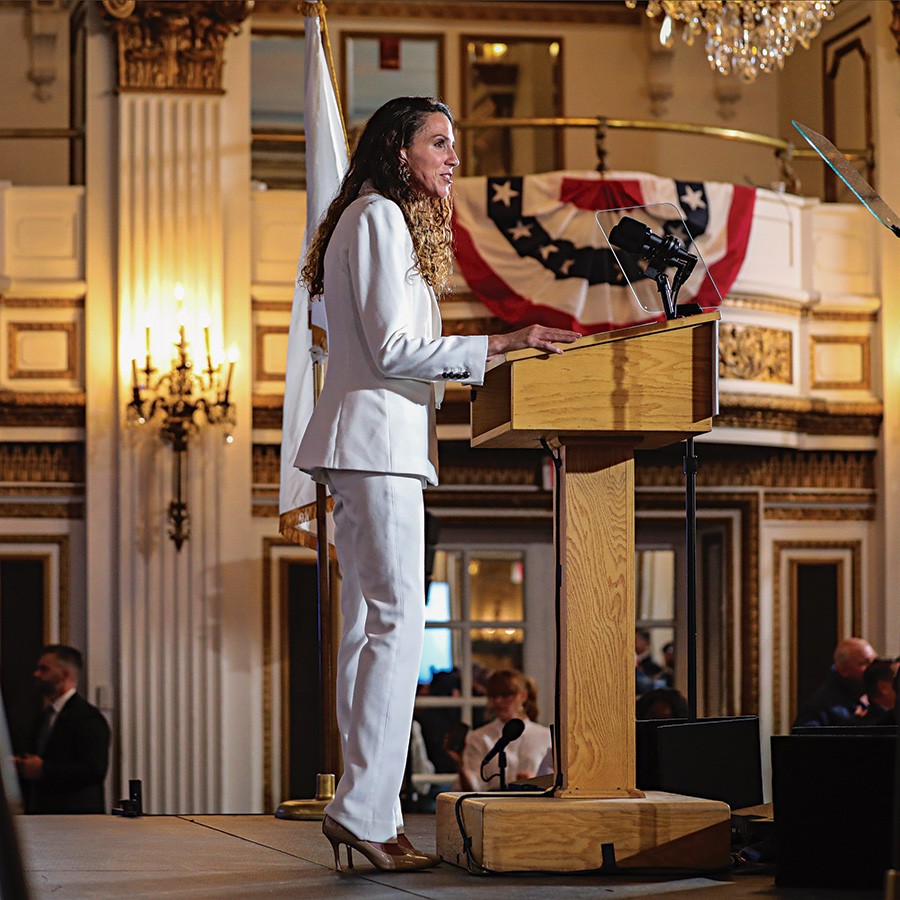
In November 2022, DiZoglio celebrated winning the election for state auditor. / Photo by Erin Clark/The Boston Globe via Getty Images
One Saturday in December, I joined DiZoglio at a Christmas party hosted by a former employer. Inside the Summer Shack in Cambridge, wearing a festive red turtleneck sweater and black pants, DiZoglio navigated her way around the lobster tank to greet ex-colleagues. One of them wrapped his arms around her in a warm embrace, while another recalled his belief from many years ago that she was bound for greatness. After about an hour of catching up, DiZoglio was ready to head to her next event. She was halfway to the door when a woman stopped her. “I love what you are doing,” she said. “You are a bad-ass bitch.”
In the days I spent with DiZoglio, I watched countless people tell her, and me, that they liked what she was doing—albeit not always with such colorful language. At one event, someone handed her a piece of crystal, explaining that it was the most “transparent” form of quartz on earth.
Some of DiZoglio’s popularity surely stems from her upbeat, outgoing, and down-to-earth personality, not to mention her fighting spirit. But some of it certainly has to do with the unpopularity of the entity resisting her audit. For years, advocates and current and former members of the legislature have been grumbling in reports and op-eds that democracy in Massachusetts is in crisis because of the State House’s lack of transparency. Everyone from former and current representatives to the Boston Globe editorial board has complained that open debates, the lifeblood of deliberative bodies, are now rare. When it comes time to vote, representatives often first lay eyes on legislation—including major bills—mere hours before casting their ballots, according to a 2021 report on legislative dysfunction from the citizen advocacy group Progressive Democrats of Massachusetts. This process makes it difficult for lawmakers to make informed decisions.
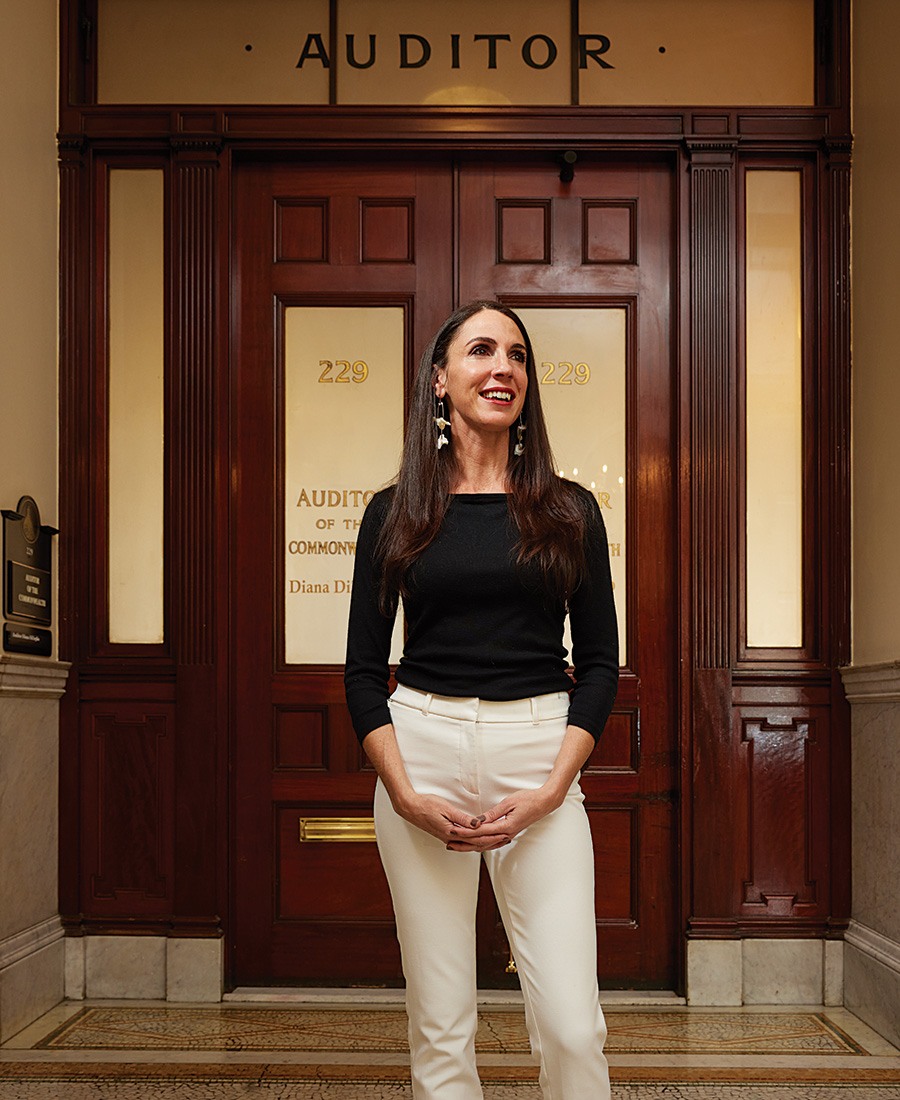
When she was younger, many people told DiZoglio, pictured in front of her office in the State House, to pursue a career as a professional singer. / Photo by Ken Richardson
Critics say it hardly matters because representatives are persuaded to vote with their leadership anyway. According to the transparency advocacy group Act on Mass, a majority of House members vote with the speaker more than 90 percent of the time. In one famous instance five years ago, the speaker’s vote on a bill was marked as a nay on the electronic board that hangs in the chamber, and immediately, 63 legislators voted nay, too. A hot mike picked up a discussion that revealed the speaker’s vote had been recorded incorrectly, and suddenly, it was changed to a yea. Instantly, all 63 members switched their votes. This concentration of power, the Progressive Democrats report stated, leads to “largely performative democracy,” where power is in the hands of a select few members who are only accountable to the voters in their districts.
Meanwhile, the lack of openness in the legislature also stifles democracy. Unlike in the U.S. Congress and some other states, on Beacon Hill, committee votes in the House take place behind closed doors. (Despite the fact that in 2020 and 2022 the majority of voters supported recorded committee votes in non-binding ballot questions, the House has refused to change its rules.) This gives legislators the opportunity to kill bills that they wouldn’t vote against publicly on the floor and makes it hard for their constituents to hold them accountable, according to the report from the Progressive Democrats. Even floor votes are merely yeas and nays—listening for who has more votes rather than an organized roll call—meaning constituents often don’t know how their representatives voted, Act on Mass points out. What’s more, the legislature is not subject to open meetings laws and public records requests.
There is likely nothing that rankles voters more than the idea that regular people are being screwed over in closed-door deals by an elite group of unaccountable, insider politicians. Due to her outspoken nature, DiZoglio has emerged as the rare politician who can channel and champion that rage. She is at once someone in power and someone who can claim outsider status. “I talk to regular folks, that’s my space—everyday people in the community—and these people feel frustrated by a lack of access to what’s happening,” she says. “And it’s surprising to some when I say, ‘That’s been my experience, too.’ They assume that when you have been in government, you are supposed to have access, and I say, ‘Well, no, because there is a special club on Beacon Hill that some of us don’t belong to and don’t want to belong to, and they hold the power.’ That resonates with people.”
It squares differently with some people, though, particularly those who are part of the political establishment. Nowhere was the contrast between how voters and elected officials feel about DiZoglio clearer than at the Massachusetts Democratic Party State Convention this past fall. Days before the event, DiZoglio learned that she’d been left off the list of speakers, the only statewide officeholder omitted. It wasn’t until party members started complaining to chairman Steve Kerrigan, she says, that she was added to the program.
In an email to Politico at the time, Kerrigan said that DiZoglio was left off the program because she did not ask to be included. DiZoglio says that speakers, including herself, never had to make such requests in the past, and no one informed her there had been a change in procedure. It might be tempting to think that part of the reason she was left off the program was because party leaders were upset that she reached across the aisle, requesting and receiving help with the signature drive for the ballot question from state Republicans, who have much to gain politically if the audit digs up any dirt on the Democratic-led legislature. After all, some Democrats I spoke with did express their surprise and discomfort with that move. For her part, DiZoglio thinks she was left off the program as a favor to leaders on Beacon Hill. She insists that auditing the legislature is not a battle between Democrats and Republicans—it’s about voters versus a few Democratic Party leaders and insiders versus outsiders. “We all agree there should be transparency in government,” she says. “We all want to know how our tax dollars are being spent.”
At the party convention—in what has now become classic DiZoglio form—she wound up stealing the show, dancing on the stage to the song “Walking on Sunshine” and wearing a bright yellow blazer, yellow ballet flats, and yellow dangling earrings. “I audit over 200 state entities and departments, and the only one that has refused to comply is unfortunately our own state legislature,” she said, prompting a chorus of boos. Then about halfway through her allotted time, she broke out into song—and not just any song: DiZoglio, a gifted singer who was encouraged to pursue a professional singing career when she was younger, had written a tune about her quest to audit the legislature. The crowd went wild. Since then, the Democratic State Committee unanimously adopted a resolution supporting DiZoglio’s audit of the legislature.
In December, DiZoglio and I rushed across the marble floors of the State House, late to an event because we had lingered too long at a press shindig where DiZoglio showed up on-brand, toting two four-packs of “Sip of Sunshine” beer. As we scurried through Memorial Hall, we came upon a Republican state senator and a church choir comprised of teens from his district who were about to test the hall’s acoustics with their Christmas carols.
“Oh my God, we have to stop,” DiZoglio said, dropping her bag on the floor near the wall. The senator called DiZoglio over and introduced her, telling the chorus, “You may be standing next to a future governor or U.S. senator.”
He was hardly the first person to point out that DiZoglio has a long political runway ahead of her. In fact, some critics think that’s the entire endgame behind her attempt to audit the legislature. Multiple people told me they believe she’s not really about lofty, universal goals of transparency and accountability, but rather raw ambition for higher office and power. One former government official went so far as to say that DiZoglio knows she doesn’t have the authority to audit the legislature yet has seized on the issue because, politically, it’s bulletproof. “Everyone wants to believe the worst of their state government, and she is playing on that. We all know she wants to be governor, and this is how she is going to show that she is on the side of the people and that she is the one who can fix it. Does that remind you of anyone else in political life?” the former official said, adding that DiZoglio is essentially a one-trick pony who has been dining out on her story of being a victim of sexual harassment, to great effect, for the better part of her career.
Meanwhile, a former elected official says DiZoglio is out for retribution for how she was treated when she was an aide. “I’m concerned about people with an axe to grind,” the former elected official says. “Today’s issue might seem like a good one. But what happens when she has another axe to swing? Look at Donald Trump.” Writing in the Boston Herald, political columnist Joe Battenfeld agreed, saying she “seems more bent on getting revenge on her critics and the legislature than producing any real results.”
Meanwhile, Democratic state Representative Russell Holmes, a longtime proponent of House reform, says he has a tough time getting behind her even though they share many of the same goals. She is driven by anger, he says, and “her approach seems to be one that has been led by vindictiveness. She is right on the issues; her approach is not.” The former government official also questioned whether DiZoglio would be the right person to audit the legislature, if it ultimately ends up being legal, because her long-running complaints about both houses call into question whether she has the legally required objectivity to conduct the audit.
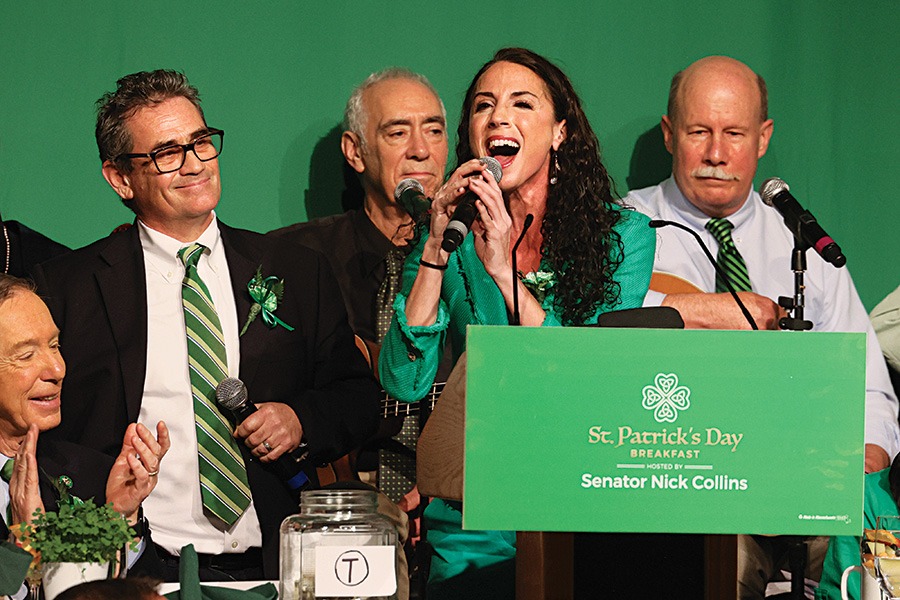
These days, DiZoglio often sings at political events like the St. Patrick’s Day Breakfast. She even wrote a song about her quest to audit the legislature. / Photo by Jessica Rinaldi/The Boston Globe via Getty Images
DiZoglio denies she is after higher office, saying that she is focused on the present and passionate about the audits she is conducting and the one she is trying to conduct. (Though they get few, if any, headlines, DiZoglio is working on many other audits, including one of the MBTA.) She notes that people who have followed her career know she’s always cared about the issues she is tackling now as auditor. She also denies that she is out for revenge—she just happens to have had an unfortunate experience that has made her well poised to advocate for change. “If you’re a cancer survivor, and you go into the State House, and you talk about the need to make sure that we have access to healthcare services for cancer patients, are you just an angry cancer survivor?” she asks. “Is it all about just getting revenge on your cancer?”
Whatever her motives, many people across the state are deeply invested in the audit of the legislature. In November, just weeks after getting the bad news from Campbell, DiZoglio announced that she and her supporters had collected more than 100,000 signatures, 25 percent more than needed to get her question on the ballot. Those signatures are now being certified. If all goes according to her plan, it will be approved for the ballot and soon pass. “This is a popular initiative; there is no question about it,” says Democratic political strategist Mary Anne Marsh. “Diana DiZoglio, thus far, is winning in the court of public opinion. Whether she wins in the court of law is another matter.”
As a next step, it seems probable that the legislature—or a surrogate that could spare lawmakers from the unfortunate position of suing someone calling for transparency—will take the state auditor to court. Eventually, it may be up to the Supreme Judicial Court to decide on the constitutionality of the audit.
Some legal and political experts have sided with the legislature’s assertion that an audit would be a clear violation of the state constitution—even the attorney general hinted at it—and there is case law that seems to suggest it would run afoul of separation of powers. Still, Northeastern University professor emeritus of law Peter Enrich, who focuses on state law, cautions that this argument is not as straightforward as it appears. “The real thing that separation of powers forbids is one branch actively interfering with the central operations of another,” observes Enrich, who is a supporter of the audit. “It may have recommendations for changes of behavior, but it doesn’t exercise any control or interference with the future behavior of [the legislature].”
If the court agrees with Enrich, DiZoglio’s political star will likely continue to shine. But if the court rules against her, could this be the end—not just of the audit, but of DiZoglio’s meteoric rise? Probably not, and that might be what has so many members of the political establishment sweating bullets.
Even if DiZoglio fails, she can still pull out a win for her political future, largely because she has the perfect foil in the legislature. Yes, the state’s highest court could disagree with DiZoglio, allowing lawmakers to argue that they’re not anti-transparency but pro-democracy and pro-constitution. Yet in reality, most voters will likely just see a murky body going to court to avoid opening its books to the public. That could make voters resent lawmakers—and love DiZoglio—even more.
The good news for supporters of the ballot initiative is that no matter what happens in court, it probably wouldn’t be the end of DiZoglio’s quest to audit the legislature. There is always the option of changing the constitution, as was done recently with the millionaires’ tax. It’s a longer process and a tougher challenge, but DiZoglio still has three years left in her term, and she can always run for reelection. Most important, perhaps, is that DiZoglio isn’t backing down anytime soon. “This is winnable,” she assures me. “It’s not a question of if, but when. The thing is just not to give up.”
First published in the print edition of the March 2024 issue with the headline, “Diana DiZoglio Won’t Back Down.”


